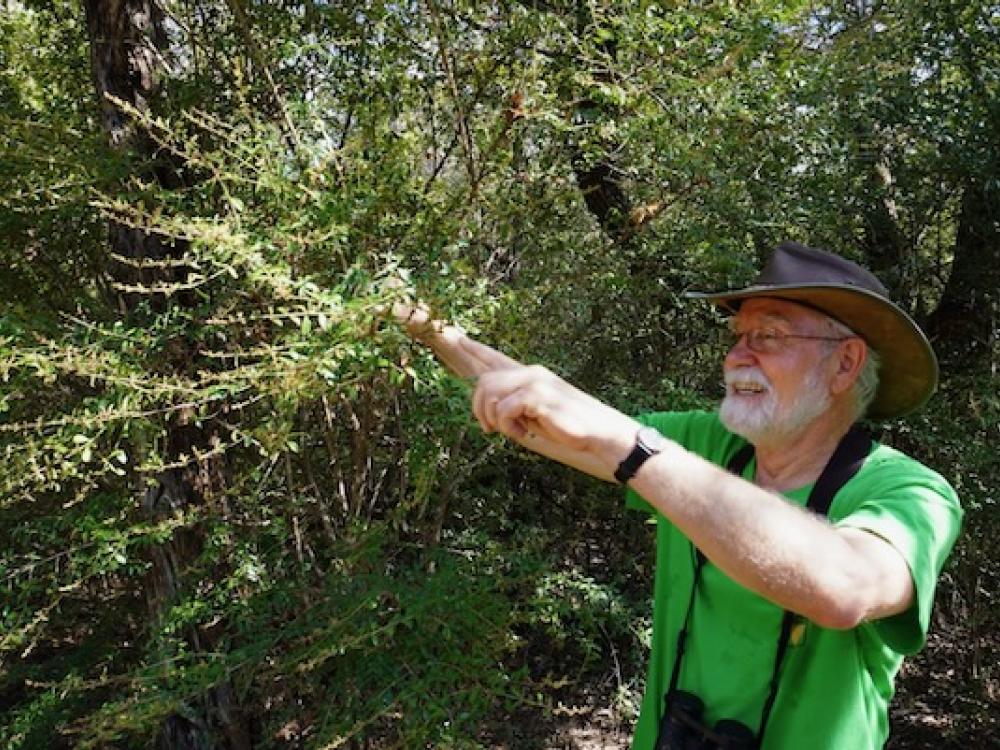
Dick Schoech, president of the Arlington Conservation Council, points to the invasive Chinese privet along the hiking trail at Crystal Canyon Natural Area in north Arlington. Schoech and other environmentalists have urged city staff to remove invasive species. Photo by Haley Samsel | Fort Worth Report.
By HALEY SAMSEL, FORT WORTH REPORT
Sept. 25, 2023
Walking through north Arlington’s Crystal Canyon Natural Area, visitors can see the evidence of invasive weeds everywhere. The colorful flowers and glossy berries sprouting along the half-mile trail path mean one thing to Arlington Conservation Council President Dick Schoech: Chinese privet.
Members of Schoech’s environmental group have spent years pushing city staff to take action on the invasive species, a bushy plant native to Asia. Sold in the U.S. as a hedge plant since the 1800s, Chinese privet features seeds that spread quickly, allowing it to easily crowd out native plants crucial to local wildlife and biodiversity.
Schoech has watched the plant start to take over Arlington’s parks and natural areas, including Crystal Canyon and River Legacy Park. Privet is draining water and nutrients away from native vegetation — including older native post oaks — during drought periods, he said.
“It's a problem that they have to get under control,” Schoech said. “Otherwise our parks are going to just be solid privet. The trees are going to be gone … That’s not good for the environment.”
Armed with a $150,000 grant from the U.S. Forest Service, the city of Arlington is now exploring long-term solutions to managing and eradicating privet throughout its park system. The pilot project will be focused on Crystal Canyon, said Michael Debrecht, Arlington’s assistant parks director.
The 40-acre park is surrounded by development and neighborhoods, making it ideal for monitoring a pilot project to eradicate invasive species, Debrecht said. Reducing privet also will allow the city to expand the hiking trail system at Crystal Canyon and create more accessible green space for residents, he said.
“It's not like River Legacy Park, where we have 1,300 acres,” he said. “We want to try to restore Crystal Canyon to what it should be. Chinese privet takes over and destroys that biodiversity. If we can eradicate it here, then Crystal Canyon can come back to being that unique park.”

Arlington’s program is one of 385 proposals across the country receiving more than $1 billion in funding through the Forest Service’s Urban and Community Forestry Program.
Projects in south Dallas, Garland and Houston are also receiving millions to plant and maintain trees, increase access to nature and combat climate change. The funding, which targets disadvantaged and low-income communities, was made available through the Inflation Reduction Act passed last year.
Privet is typically removed through a combination of pulling it out by the root and treating the area with herbicide. However, missed plants and seeds often resprout quickly. Arlington has never rolled out a formal privet eradication program, although staff have targeted certain areas for removal, Debrecht said.
He expects the city to spend two to three years studying which techniques are most effective at Crystal Canyon and how to expand those strategies to the rest of Arlington’s parks.
“Let’s say Arlington can eradicate all of her privet. Well, that doesn’t mean Fort Worth and Dallas can, so it will come back,” Debrecht said. “It’s going to be an ongoing battle, but at least we want to try to preserve as much of our native land as possible.”
For Schoech, the city’s move to address the problem is the result of advocacy from the Arlington Conservation Council and its subgroup, Friends of Arlington’s Natural Areas. Staff recently purchased a grinder that will make removing invasive species a more achievable feat, Schoech said.
He appreciates the parks department’s willingness to take action while working within a limited budget but wants greater communication between the city and willing volunteers who care about Arlington’s environment.
“They’ve made the investments. We would be willing to help do these kinds of things with them, but we just got to know what’s going on,” he said. “We’ve got to work together, and we really need to agree on some common goals.”

Haley Samsel is the environmental reporter for the Fort Worth Report. You can reach them at haley.samsel@fortworthreport.org.
This article first appeared on Fort Worth Report and is republished here under a Creative Commons license.
RELATED ARTICLES
How North Texas natural areas are battling privet
Local success stories in the fight against privet
Fort Worth to mow down 'acres' of privet at Tandy Hills
Stay up to date on everything green in North Texas, including the latest news and events! Sign up for the weekly Green Source DFW Newsletter! Follow us on Facebook,Twitter and Instagram. Also check out our podcast The Texas Green Report, available on your favorite podcast app.









